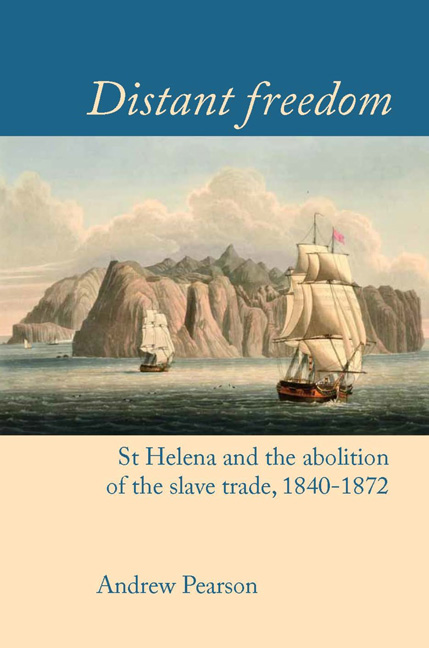Book contents
- Frontmatter
- Dedication
- Contents
- Figures
- Tables
- Acknowledgements
- Introduction
- Map
- 1 A Place of Immense Advantage
- 2 London and Jamestown
- 3 Sailortown
- 4 Life and Death in the Depots
- 5 ‘All, all, without avail’
- 6 After ‘Liberation’
- 7 Island Lives
- Conclusion
- Appendix 1 Liberated Africans Captured aboard Slave Ships: Cases Tried at Freetown, Luanda, Cape Town and St Helena, 1836–68
- Appendix 2 Prizes Adjudicated by the Vice-Admiralty Court of St Helena
- Appendix 3 Liberated African Emigration from St Helena
- Appendix 4 Emigrant Voyages from St Helena
- Bibliography
- Index
7 - Island Lives
- Frontmatter
- Dedication
- Contents
- Figures
- Tables
- Acknowledgements
- Introduction
- Map
- 1 A Place of Immense Advantage
- 2 London and Jamestown
- 3 Sailortown
- 4 Life and Death in the Depots
- 5 ‘All, all, without avail’
- 6 After ‘Liberation’
- 7 Island Lives
- Conclusion
- Appendix 1 Liberated Africans Captured aboard Slave Ships: Cases Tried at Freetown, Luanda, Cape Town and St Helena, 1836–68
- Appendix 2 Prizes Adjudicated by the Vice-Admiralty Court of St Helena
- Appendix 3 Liberated African Emigration from St Helena
- Appendix 4 Emigrant Voyages from St Helena
- Bibliography
- Index
Summary
Most liberated Africans experienced St Helena only as a temporary transit camp, but a small number – roughly 3% of those who survived their time in the depots – became permanent residents of the island. This chapter tells their story.
The African settlers mainly belonged to the first intake, that is to say those received into Lemon and Rupert's Valley during 1840–43. A census of the Establishment taken at the end of the decade recorded that 391 were denizened on the island by January 1844, a further 34 up to March 1846 and 118 more by December 1849. A few others are known to have settled at the very start of the 1850s, amongst them recaptives taken by HMS Cyclops in 1850, some of whom – as detailed at the end of this chapter – were still living half a century later. Virtually no new arrivals stayed on St Helena after 1851, the exceptions being those who were disabled, or otherwise too sick or old to make an onward journey: these people were kept apart from the residual African community, confined to the Rupert's Valley depot or incarcerated in the island's asylum.
The liberated African community grew throughout the middle of the century. In 1854, there were reported to be nearly 200 families present, and by the early 1870s the number of Africans ‘of pure blood’ was around 750. This figure represents the high point since, in 1872, over a third of this number emigrated to Africa. The community dwindled thereafter, as the first-generation recaptives died and their descendants merged into the general island populace.
Dispersal and settlement
During the early 1840s, the liberated Africans retained a close connection with Lemon Valley. In the period before emigration was developed as a means of emptying the depots, many lived there permanently while others gravitated back to family or comrades after failed periods of employment or apprenticeship. This connection was, however, largely severed by the breaking up of both depots at the end of 1843, triggering a more general diaspora among those Africans who remained in the colony. By the start of the 1850s, the liberated Africans had dispersed widely across the island.
- Type
- Chapter
- Information
- Distant FreedomSt Helena and the Abolition of the Slave Trade, 1840–1872, pp. 242 - 270Publisher: Liverpool University PressPrint publication year: 2016



